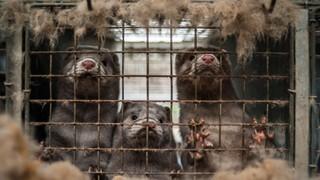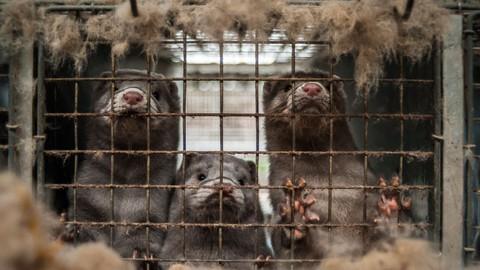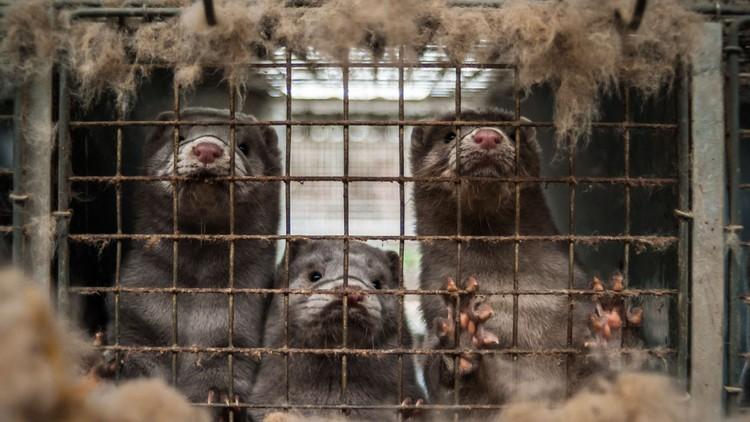
COVID-19 is Spreading Through Fur Farms Across Europe
#Livekinder is the path to a solution
It has been impossible to avoid the reach of COVID-19, changing and endangering our lives across 2020 and now beyond. The spread has been seemingly unstoppable, and, as of April 2020, it has now made its home in fur farms across the world. These infected farms have been found in the Netherlands, Denmark, Spain, Sweden, Italy, France, Poland, Greece, Lithuania, Canada and the USA.
Alongside this, these farms are also infected with something else. Something insidious and far more rooted in the industry: cruelty. Even without the risk of COVID-19 infection, these farms are breeding grounds for suffering. They see animals kept in incredibly uncomfortable cages and unsanitary conditions, before they are killed through brutal, painful, and callous methods. All of this, is in the name of fashion.
Millions killed through fear
Due to the fact that the virus can jump back and forth between humans and mink, potentially mutating in animal before re-infecting people, mass cullings have been taking place. In Denmark alone, the largest European fur producer, the entire mink population of 17 million animals were killed, including the animals on non-infected farms.
This loss of life is avoidable. This virus has been a wake up call for us on a global scale, that the cruel treatment of animals isn’t something we can outrun. These farms are the perfect incubation chamber for the next pandemic. By ending the trade, we end the suffering, and we create a brighter future. Because, when they suffer, we suffer.
The reality behind the clothing
We can all make a difference when it comes to bringing an end to the fur trade.
The first step? Knowing the truth and avoiding real fur products.
Place your cursor or finger over the image, click/tap, and erase the top image to reveal the truth.




Wasteful and cruel
The bottom line is that these animals should not be on these farms at all. Mink bred for their fur are kept in cramped wire cages in a very confined space, where they have no chance of satisfying their basic needs.
Not only do these conditions both stress and weaken the animals, their keeping of being crammed closely together with thousands of conspecifics, unfortunately, provide the ideal breeding ground for the spread of infectious diseases.
By choosing a #LiveKinder approach, we can avoid this cruel and unnecessary waste of life while also avoiding the potential risks that they pose to both us as a species, the lives we lead, and the world we live in. In Denmark, more than 200 people have become infected with SARS-CoV-2 from mink farms, some of them with a mutated form of the virus known as 'Cluster 5', which could reduce the effectiveness of vaccines.
This could come to our doorstep.
How the spread continues
Our Decisions and the Fur Trade Pandemic

The Decision
Buying fur products condones the trade. Brands like House of Fraser and Canada Goose are still selling fur products, make sure you check the label.

The Consequences
Even though fur farming is banned in the UK, we're still supporting global fur farming by continuing to import £90 million worth of fur each year!

The Reality
Fur farming is spreading covid-19 across Europe, posing a huge risk to human health. When #theysufferwesuffer.
The Solution
Sign the petition below to help us bring an end to the fur industry, the cruelty inherent in it, and the dangers that it poses to our future.
We must act
The fur industry is an animal welfare tragedy, but, now it could turn into a global tragedy. We have a chance to draw a spotlight to this and bring an end to this outdated industry for good.
Some countries have already taken this opportunity:
- Following the massive COVID-19 outbreaks on mink farms, the Netherlands announced in August 2020 the early end of fur farming and all mink breeders must cease operations by 1 March 2021.
- In September 2020, France also decided to end its mink farming.
- In November, Hungary banned the breeding of mink and foxes, polecats and coypus due to animal welfare concerns and public health risks, and therefore no farms can be opened there.
- In January 2021 Sweden decided to suspend mink farming for 2021, which means no breeding will take place. In Flanders (the last region with mink farms in Belgium) mink farmers declared voluntarily to suspend production until end of 2021.
Change is happening, together we can ensure it’s a change for good.





